Of all horror films made in the 1970s the most successful, certainly the most famous, are The Exorcist (1973) and The Omen (1976). But while the former basks in the reflected glory of being the scariest picture ever made – with no proper explanation ever given or deemed necessary – the latter is largely dismissed as bubblegum pap, Hollywood schlock horror bearing no comparison to its respected predecessor. But look more closely at The Exorcist and it soon becomes apparent that the silver sheen is the cheap flash of EPNS, while that comforting glow emanating from The Omen is glorious 24 carat gold.
The fact is, The Omen is miles better than The Exorcist. The legend that’s grown up around William Friedkin’s child-possession fable is more myth than anything else. Richard Donner’s fantastic fable of apocalyptic prophesy deserves all the praise that can be shovelled upon it. While The Exorcist has had the benefit of being banned from release for a long period, building up people’s expectations of it and and therefore a totally understandable deduction that it therefore must be really, really scary, The Omen has plodded on entirely under its own steam.
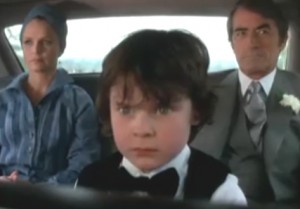 |
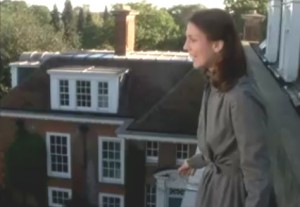 |
Nostalgia plays its part too. Memories of teenage nights huddled around a hired telly with a tenth generation copy of The Exorcist playing through a top-loading Videostar and appearing on screen through more snow than is usually visible on a documentary about weather patterns in the Arctic adds massively to the appeal. Anyone who wanted to see The Omen only had to wait long enough for it to crop up on telly. When The Exorcist went back on general release and the snow lifted, it transpired it was never that good to begin with. Only lovers of American period furniture could ever be scared by the goings on in the bedroom of little Regan. And while there are some people who find the sight and sound of a teenage girl with bad skin and lank hair and a speaking voice tempered by forty Capstan Full Strength, most have seen worse hanging around city centre bus stops on a Saturday night.
But The Omen is quite, quite different. Permeated from start to finish with a marvellous air of dread, it draws the audience in by setting the most pertinent action in comfortably normal situations – hospitals, churches, parks, offices – but then distorts them just enough to keep them recognisably real, but horribly so. All of the most diabolical incidents in The Omen take place in the most ordinary of settings. Lee Remick is finally offed in her hospital room, her last sight (prior to the roof of the ambulance below) being, unfortunately, her dreadful nylon bed jacket. Billie Whitelaw is dispatched to hell from her kitchen. And when Gregory Peck finally cashes in his chips, it’s at the hands of a policeman acting in the name of the law rather than a slavering apostate of hell. Though the difference between the two rather depends on your opinion of the police.
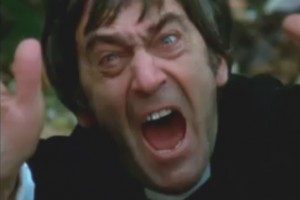 |
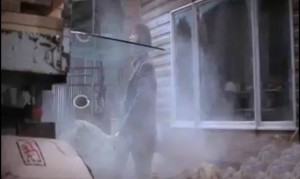 |
The most famous exit for any of the leading characters is that of David Warner, Peck’s photographic sidekick during the investigation into little Damian’s real identity. What makes Warner’s eventual demise doubly shocking is that it doesn’t take place in the hugely creepy catacombs he and Peck visit immediately beforehand, in order to receive instruction from the similarly hugely creepy Leo McKern into how to teach Damian a lesson he’ll never forget. Donner’s too clever for that. He allows Peck, Warner and the audience to leave the claustrophobic atmosphere of the underground caverns and breathe a sigh of relief in the sunny afternoon, only for Warner to be decapitated by sheet of glass slid off the back of a runaway truck escaping from a building site presumably not in possession of the necessary Health and Safety certificates. The effect of what would already have been a shocking death is therefore massively increased and comes as far more of a jolt than Freidkin’s surly teenager could ever manage by ralphing up some pea and ham.
The demonic execution of the priest played by Patrick Troughton is a little different. Being skewered by his own church’s lightning rod may count as the most ironic end to a character in cinema history, but hardly the most shockingly realistic. But Troughton’s character, necessary for some brilliantly histrionic exposition, is probably the most hysterical and extreme in the whole film – his eye-rolling delivery of the famous, ‘When the Jews return to Zion…’ passage from the imaginary book of Hebron is one of the film’s highlights – and makes Billie Whitelaw’s Satanic nanny seem like a model demonstration of The Method. So a suitably demonstrative destruction was required and doesn’t jar.
The Exorcist is quite different. The level of mania surrounding the possession is no more than cartoonish in its realisation. Tellingly, the most successful moments of the film involve the all too real medical procedures carried out on Regan, possessed by a demon with the voice of Wolfman Jack and the skin tone of Derek Jameson, and the fantastically terrifying ethnic music listened to by Father Karras’ mother on a tiny radio. The rest is just pantomime.
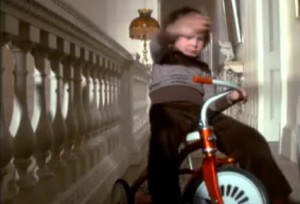 |
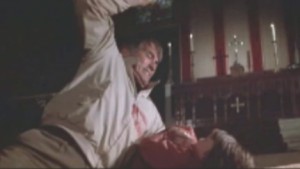 |
Most of the performances in The Omen might also be described as one-note. Lee Remick isn’t really required to do much, an expectation she lives up to spectacularly well. Even supporting actor stalwarts Bruce Boa and Julian Glover don’t add much, though they scarcely get the opportunity. Accusations are forever being levelled at the portrayal of Robert Thorn, the US Ambassador and adoptive father of juvenile antichrist Damian, on the part of Gregory Peck. Too wooden, it’s said, too conservative. Ambassadors aren’t known, however, for their sense of gregarious élan, with probably only Shirley Temple Black standing as the only one in the history of the State Department who could have carried off a decent anecdote. So Peck’s decidedly wooden performance is as accurate as any would ever get, at least in a tale of demonic possession.
The Exorcist trades on the rather silly precept that it’s in some way based on an actual series of events, as described in the book by William Peter Blatty on which the film is based. But as the Coen Brothers showed by falsely claiming that their Fargo (1996) was based on a real life incident and watching the alarm that built up on the part of the audience, such a claim is incredibly easy to make and the attendant fuss is hardly ever justified. The only thing The Omen ever claimed to be was silly, fun and scary. A mission it accomplished with frightening ease.




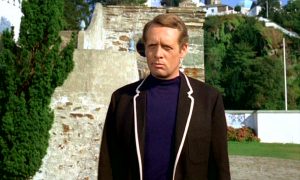

















Max Von Sydow
June 30, 2010 at 10:58 pm
It’s a pity that The Exorcist and The Omen are forever compared as if one was overshadowing the other, because it’s possible to like both when they’re top entertainment in their own rights. As many people thought The Omen was true because it was “based” on the Bible as thought The Exorcist was true, in fact if anything more believed The Omen with its bigger, more persuasive picture of the world going to hell in a handcart.
Why shouldn’t horror movies take themselves seriously after all? They were telling audiences what they wanted to hear back then, in their own way, which is more than the tepid, oh so jaded horrors you get these days do.
Foz
July 8, 2010 at 8:53 am
The Omen is the seminal horror film and wipes the floor with all the others. It is helped by the cracking Anglo-American cast including a few seventies forgotton-supporting-cast-favourites like John Stride. Even the recent remake couldn’t improve on this formula and seemed to follow the original word for word, albeit in up to date surroundings.
Cindylover1969
July 15, 2010 at 7:56 am
The score won the great Jerry Goldsmith his only Oscar (and he got a Best Original Song nomination for “Ave Satani,” even though albums with the likes of Maureen McGovern warbling “Sanguis bibimus, corpus edimus…” are conspicuous by their absence).
At least he got it for one of his most famous works – Elmer Bernstein won HIS only Oscar for “Thoroughly Modern Millie.” Not “The Magnificent Seven,” not “The Great Escape,” not even “Far From Heaven,” but for “Thoroughly Modern Millie” (he isn’t even on its soundtrack album!).
George White
February 28, 2016 at 9:41 am
Julian Glover’s not in it. John Stride is.